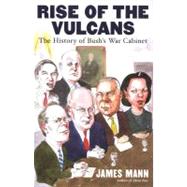
Note: Supplemental materials are not guaranteed with Rental or Used book purchases.
Purchase Benefits
What is included with this book?
| Introduction | ix | ||
| ONE: A Rising Politician Amid War and Dirty Tricks | 1 | (20) | |
| TWO: The Intellectual as Protege | 21 | (16) | |
| THREE: A Soldier and a Sailor | 37 | (19) | |
| FOUR: Combating the Soviets, Detente and Henry Kissinger | 56 | (23) | |
| FIVE: Enter the Persian Gulf | 79 | (16) | |
| SIX: Transitions | 95 | (17) | |
| SEVEN: Camelot of the Conservatives | 112 | (15) | |
| EIGHT: Of Dictatorships and Democracy | 127 | (11) | |
| NINE: In the Midst of Armageddon | 138 | (12) | |
| TEN: A Scandal and Its Aftermath | 150 | (15) | |
| ELEVEN: A New Republican President, a New Foreign Policy Team | 165 | (14) | |
| TWELVE: Use of Force | 179 | (19) | |
| THIRTEEN: Death of an Empire, Birth of a Vision | 198 | (18) | |
| FOURTEEN: Vulcans in Exile | 216 | (18) | |
| FIFTEEN: A Vulcan Agenda | 234 | (14) | |
| SIXTEEN: The Campaign | 248 | (13) | |
| SEVENTEEN: Who Runs the Pentagon? | 261 | (16) | |
| EIGHTEEN: Warnings and Signals | 277 | (17) | |
| NINETEEN: History Starts Today | 294 | (17) | |
| TWENTY: A New Strategy | 311 | (21) | |
| TWENTY-ONE: Toward War with Iraq | 332 | (27) | |
| Conclusion | 359 | (14) | |
| Acknowledgments | 373 | (4) | |
| Notes | 377 | (34) | |
| Index | 411 |
The New copy of this book will include any supplemental materials advertised. Please check the title of the book to determine if it should include any access cards, study guides, lab manuals, CDs, etc.
The Used, Rental and eBook copies of this book are not guaranteed to include any supplemental materials. Typically, only the book itself is included. This is true even if the title states it includes any access cards, study guides, lab manuals, CDs, etc.